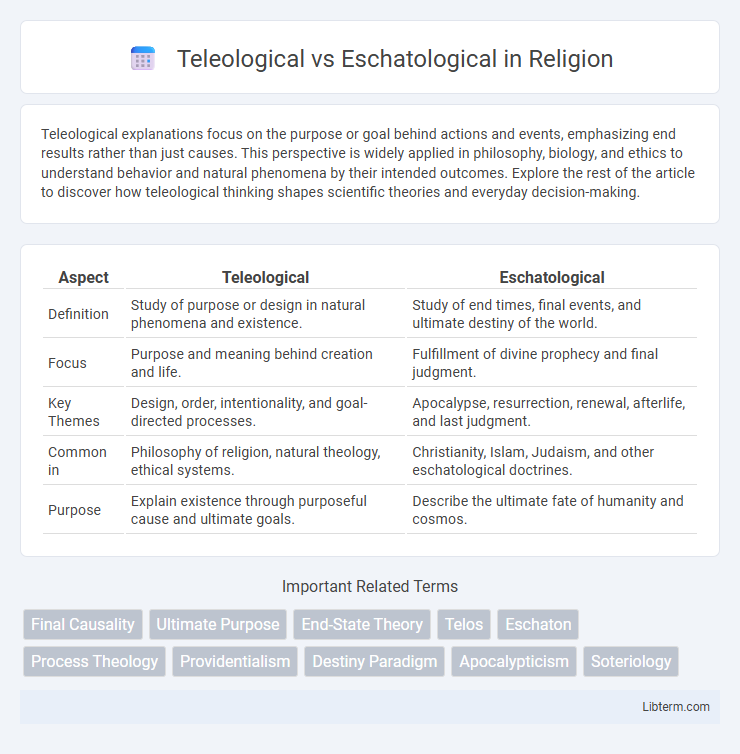Teleological explanations focus on the purpose or goal behind actions and events, emphasizing end results rather than just causes. This perspective is widely applied in philosophy, biology, and ethics to understand behavior and natural phenomena by their intended outcomes. Explore the rest of the article to discover how teleological thinking shapes scientific theories and everyday decision-making.
Table of Comparison
| Aspect | Teleological | Eschatological |
|---|---|---|
| Definition | Study of purpose or design in natural phenomena and existence. | Study of end times, final events, and ultimate destiny of the world. |
| Focus | Purpose and meaning behind creation and life. | Fulfillment of divine prophecy and final judgment. |
| Key Themes | Design, order, intentionality, and goal-directed processes. | Apocalypse, resurrection, renewal, afterlife, and last judgment. |
| Common in | Philosophy of religion, natural theology, ethical systems. | Christianity, Islam, Judaism, and other eschatological doctrines. |
| Purpose | Explain existence through purposeful cause and ultimate goals. | Describe the ultimate fate of humanity and cosmos. |
Understanding Teleology: Definition and Origins
Teleology explores the explanation of phenomena by their purpose or goal, rooted in Aristotle's philosophy where natural processes are directed toward specific ends. This concept contrasts with eschatology, which focuses on the ultimate destiny or final events in history, often within religious contexts. Understanding teleology involves examining how objects, organisms, or systems exhibit goal-directed behavior or intentionality in their development and function.
Eschatology Explained: Meaning and Historical Roots
Eschatology refers to the theological study of last things or final events in human history, emphasizing concepts like the apocalypse, judgment day, and the ultimate destiny of the soul. Rooted in ancient religious traditions, eschatology appears prominently in Christianity, Judaism, and Islam, each interpreting end-time prophecies and cosmic conclusions uniquely. The historical roots trace back to early scriptural texts such as the Book of Daniel, the New Testament's Revelation, and Islamic Hadith, which collectively shape diverse eschatological frameworks across cultures.
Key Differences Between Teleology and Eschatology
Teleology examines the purpose or goal inherent in natural processes, emphasizing the "why" behind existence and development. Eschatology focuses on the ultimate destiny or final events in the universe, particularly regarding life, death, and the afterlife in religious contexts. The key difference lies in teleology's concern with purpose and function throughout life versus eschatology's focus on the final outcomes and culmination of all things.
Teleological Perspectives in Philosophy
Teleological perspectives in philosophy emphasize purpose and design as fundamental explanations for natural phenomena and human actions, viewing them as directed towards specific ends or goals. This approach contrasts with eschatological views by focusing primarily on the inherent purposes within processes rather than final or ultimate outcomes. Prominent thinkers like Aristotle championed teleology through the concept of "final causes," highlighting purposeful development in nature and ethics.
Eschatological Views Across Religions
Eschatological views across religions outline diverse beliefs about the ultimate destiny of humanity and the cosmos, such as the Christian concept of the Last Judgment, Islamic teachings on the Day of Resurrection (Yawm al-Qiyamah), and Hindu cycles of creation, preservation, and destruction (Kalpa). These perspectives emphasize the final events that bring about the fulfillment or transformation of existence, often involving themes of salvation, judgment, and cosmic renewal. Comparative analysis highlights how eschatology shapes ethical behavior, societal norms, and spiritual goals within religious traditions worldwide.
Purpose vs. Destiny: Core Concepts Compared
Teleological perspectives emphasize purpose as the driving force behind actions and events, focusing on goals and intentions that shape outcomes. Eschatological views concentrate on destiny, highlighting ultimate ends and final states in a broader cosmic or spiritual timeline. The core distinction lies in teleology's focus on present purpose guiding processes, while eschatology centers on predetermined ultimate outcomes or final destinies.
Teleology in Science and Ethics
Teleology in science examines phenomena by their purposes or goals, interpreting biological functions and evolutionary adaptations as directed toward specific ends, such as survival or reproduction. In ethics, teleology emphasizes the consequences or ultimate aims of actions to assess their morality, exemplified in virtue ethics and consequentialism where the good life or greatest happiness defines ethical behavior. This approach contrasts with eschatological perspectives that consider ultimate ends in a cosmic or divine context rather than empirical outcomes or practical goals.
Eschatology in Modern Thought and Society
Eschatology in modern thought emphasizes the study of ultimate destiny and final events, shaping contemporary perspectives on mortality, ethics, and the future, often integrating scientific and philosophical insights. Unlike teleological views that focus on purpose-driven progress, modern eschatological discourse explores themes of apocalypse, transformation, and renewal within societal and cultural contexts. This focus influences debates on existential risks, environmental sustainability, and technological advancements as humanity confronts potential endpoints and new beginnings.
Influences of Teleological and Eschatological Thinking
Teleological thinking, rooted in the belief that events and actions are directed toward purposeful ends, significantly influences ethical decision-making and goal-oriented planning across diverse fields such as philosophy, biology, and psychology. Eschatological thinking, centered on the ultimate destiny or final events of humanity and the universe, shapes religious doctrines, existential perspectives, and cultural narratives about meaning and destiny. Both perspectives impact worldviews by structuring how individuals and societies interpret progress, morality, and future expectations within temporal frameworks.
Contemporary Debates: Teleological vs. Eschatological Worldviews
Contemporary debates on teleological versus eschatological worldviews center on whether purpose (teleology) or final destiny (eschatology) better explains reality's progression and meaning. Teleological perspectives emphasize inherent purpose or goals within natural and social processes, influencing ethical frameworks and scientific interpretations. Eschatological views prioritize ultimate ends or final states, often rooted in religious or philosophical doctrines, shaping beliefs about history's culmination and humanity's fate.
Teleological Infographic

 libterm.com
libterm.com